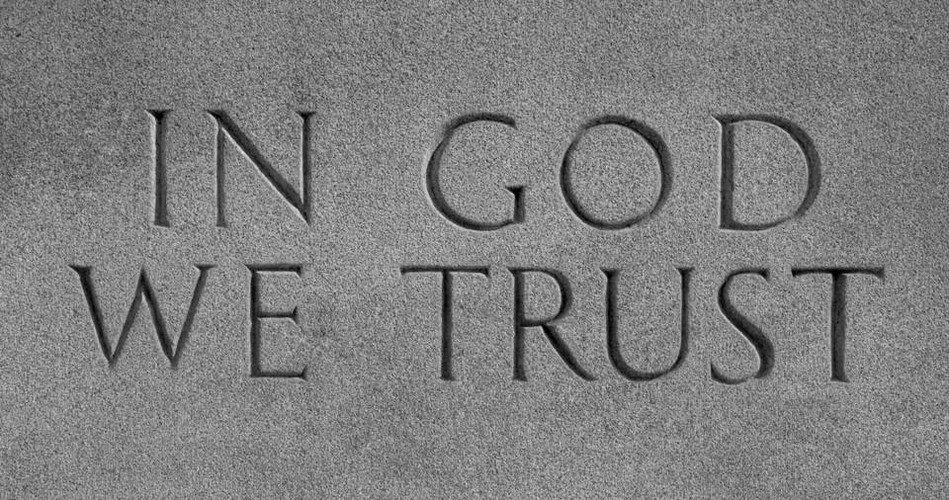
Podcast: Play in new window | Download ()
Subscribe: Android | RSS | More
A new law has taken effect in South Dakota, mandating all public schools to prominently display America’s national motto, “In God We Trust.” The measure, which was signed into law in March by Governor Kristi Noem, is meant to inspire patriotism in South Dakota students. It requires that the motto be displayed in all school facilities in an easily readable manner, in lettering that is at least 12 inches tall and 12 inches wide.
Wade Pogany, executive director of the Associated School Boards of South Dakota, said that school districts are complying with the law in a variety of ways. “Some have plaques, other have it painted on the wall, maybe in a mural setting,” he said. He noted that in one school, “it was within their freedom wall. They added that to a patriotic theme.”
The law does not provide state funding for the displays, so each school district is required to foot the bill. For example, the school district in Rapid City, in western South Dakota, paid a total of $2,800 to stencil “In God We Trust” on the walls of its 23 public school facilities, according to the Rapid City Journal newspaper.
Pogany said that one concern of school districts was the danger of lawsuits from secular and atheist legal groups such as the Freedom From Religion Foundation (FFRF). “One of our concerns was that this [law] would be contested,” he said. “So we had asked the legislature to put a ‘hold harmless’ clause into the bill. The state would then defend the schools and pay the cost of the defense.”
Predictably, the FFRF has been one of the first to protest the measure. While no lawsuits are forthcoming from the opportunistic legal group as of yet, in a press release the group’s president, Annie Laurie Gaylor, tersely commented that the FFRF’s position “is that it’s a terrible violation of freedom of conscience to inflict a godly message on a captive audience of schoolchildren.”
In its press release the godless group complained that the new law amounted to “an unvarnished attack on American secularism and civil liberties, imposing the theocratic vision of a powerful few on We The People.”
In Sioux Falls, the state’s largest school district, administrators are using the law as an opportunity to teach students more about citizenship and civic responsibility. Superintendent Brian Maher told the community’s newspaper, the Argus Leader, that along with displaying the national motto, “we’ll talk about how the capital of our nation is in Washington, DC, the population of the United States, and President Trump being the current president of the United States.” He added that the district would also focus the lessons on civics and citizenry to the state and local levels.
Fox News noted that “a growing number of states have allowed ‘In God We Trust’ in schools and other public areas in recent years. Indiana lawmakers are considering a bill that would add ‘In God We Trust’ posters to classrooms in public schools. A California city in June approved adding the motto to its police and fire vehicles.”
And NPR reported that “within the last couple of years, six Southern states — Louisiana, Arkansas, Tennessee, Florida, Alabama, and Arizona — have approved similar legislation, enforcing or allowing public schools to post the U.S. motto.”
The phrase “In God We Trust” was adopted as the national motto in 1956 with the legislative signature of President Eisenhower, and the phrase began appearing on U.S. currency a year later.
In June of this year the U.S. Supreme Court rejected an attempt by notorious atheist activist Michael Newdow to force the removal of “In God We Trust” from U.S. currency. In a lawsuit filed on behalf of a group of fellow atheists, Newdow had argued that “by mandating the inscription of facially religious text on every coin and currency bill,” the government was effectively transforming individuals with no faith into “political outsiders.”
On June 10 the High Court declined to hear Newdow’s case, making it the latest in a long string of defeats in his ongoing efforts to sanitize religious sentiments from the public square. The currency case had already met with numerous defeats in lower courts, with the 8th U.S. Circuit Court of Appeals last dismissing it in 2018, ruling that the phrase “In God We Trust” did not “compel citizens to engage in a religious observance.” The Supreme Court’s subsequent decision not to rule on the case means that the circuit court’s decision will stand.
Image: WilliamSherman via iStock / Getty Images Plus


